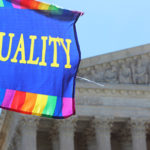Posted: 3/19/04
Hearing held on same-sex marriage
By Robert Marus
ABP Washington Bureau
WASHINGTON (ABP)–The Senate Judiciary Committee's subcommittee on the Constitution held a hearing recently to discuss the advisability of amending the Constitution to ban gay marriages.
This was the second such discussion convened by Sen. John Cornyn (R-Texas), the subcommittee's chairman. The subcommittee sponsored a similar hearing Sept. 4. Since then, the Massachusetts Supreme Judicial Court twice has affirmed that state's Constitution requires equal marriage rights for same-sex couples.
The Federal Marriage Amendment, currently making its way through both houses of Congress, would ban marriage and “the legal incidents thereof” for same-sex couples nationwide. Although polls show the amendment has some support from the general public, most political observers say it has little chance of passing.
At the latest hearing, Cornyn said banning gay marriage should be “a bipartisan issue.” But Democrats on the panel balked at that suggestion.
In his opening statement, Cornyn said the amendment was necessary because “activist judges like those in Massachusetts, California and elsewhere” are presenting “a clear and present danger to traditional marriage laws across the nation.”
But Sen. Edward Kennedy (D-Mass.), the Judiciary Committee's ranking Democrat, said an amendment wasn't necessary and called Bush's support for one “an attempt to salvage his faltering re-election campaign.”
Kennedy added: “President Bush will go down in history as the first president to try to write bias back into the Constitution.”
Senate Majority Leader Bill Frist (R-Tenn.) also announced the Senate will vote on the Federal Marriage Amendment before the year is over. “If we allow activist judges to redefine marriage, we are gambling with our future,” he said at a pre-hearing press conference with FMA supporters. The Senate, he added, “can't let that happen.”
Proponents of the amendment argue that once gay marriages are legally recognized in one state, the courts will force other states to recognize them.
But an expert in the portion of the U.S. Constitution that requires states to recognize legal acts of other states said there is no legal precedent for states being forced to recognize marriages performed in other states when such marriages violate the second state's public policy. “The (Constitution's) full faith and credit clause has never been read to reach that result,” said Lea Brilmayer, a professor at Yale Law School.
States that ban marriages between first cousins, for instance, have not been required to recognize first-cousin marriages from other states.
“There's always been vast differences in marriage laws between one state and another,” she said.
Under questioning by senators, Brilmayer did concede that federal courts may eventually overturn all state bans on same-sex marriage under a challenge based on a different part of the Constitution–its equal-protection provisions.
Dick Richardson, a minister in the African Methodist Episcopal Church and head of an inner-city children's social-service agency in Boston, testified in favor of a gay-marriage ban.
“The dilution of the ideal–of procreation and child-rearing within the marriage of one man and one woman–has already had a devastating effect on our community,” he said.
“We need to be strengthening the institution of marriage, not diluting it. … This discussion about marriage is not about adult love. It is about finding the best arrangement for raising children, and as history, tradition, biology, sociology and just plain common sense tell us, children are raised best by their biological father and mother.”
The hearing room was packed with same-sex couples–many of them accompanied by their young children–who had been encouraged to attend by gay-rights groups.
The proposed amendment would be the first since Prohibition designed to curtail rights rather than expand them. A reporter asked Richardson, an African-American, if that fact gave him pause in casting his support behind the FMA.
“This is about children. If you want to talk about discrimination, maybe children are being discriminated against,” he responded.














We seek to connect God’s story and God’s people around the world. To learn more about God’s story, click here.
Send comments and feedback to Eric Black, our editor. For comments to be published, please specify “letter to the editor.” Maximum length for publication is 300 words.